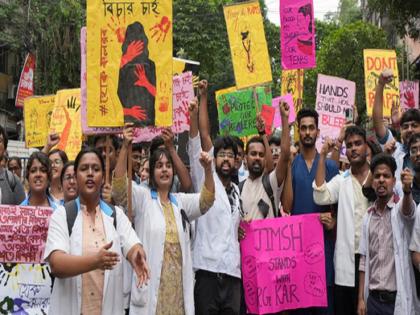Kolkata Doctor-Rape Murder Case: Resident Doctors Indefinite Strike Intensifies As Seniors Join Them
By Lokmat English Desk | Updated: August 16, 2024 13:51 IST2024-08-16T13:50:35+5:302024-08-16T13:51:16+5:30
The indefinite strike by resident doctors in Maharashtra, now on its fourth day, escalated on Friday as senior doctors ...

Kolkata Doctor-Rape Murder Case: Resident Doctors Indefinite Strike Intensifies As Seniors Join Them
The indefinite strike by resident doctors in Maharashtra, now on its fourth day, escalated on Friday as senior doctors joined the protest. The strike has led to significant disruptions in services at government and civic hospitals, causing considerable inconvenience for thousands of patients across the state.
Dr. Pratik Debaje, president of the Maharashtra State Association of Residential Doctors (Central-MARD), informed PTI that between 6,000 and 7,000 senior resident doctors from the Maharashtra Association of Bonded Resident Doctors (MABRD) and the Association of State Medical Interns (ASMI) joined the strike on Friday. “17,000-18,000 (resident) doctors in Maharashtra are on strike at present,” Debaje said.
Resident doctors in the state began an indefinite strike on Tuesday morning to show solidarity with the nationwide protest against the rape and murder of a post-graduate trainee at Kolkata's RG Kar Medical College and Hospital last week.
Also Read| Vandalism at RG Kar Hospital: Calcutta HC raises serious questions on police’s role.
On the fourth day of the strike, elective services, including outpatient departments (OPDs), operating theatres (OTs), and laboratory procedures, continue to be disrupted. This ongoing strike has led to significant inconvenience for thousands of patients in Mumbai and across other parts of the state.
The Central-MARD has demanded an impartial and transparent investigation into the Kolkata incident, speedy formation of an expert committee for implementation of the Central Healthcare Protection Act, improved security measures, including fully functional CCTVs and well-equipped guards, quality hostels, and proper on-call rooms for resident doctors.